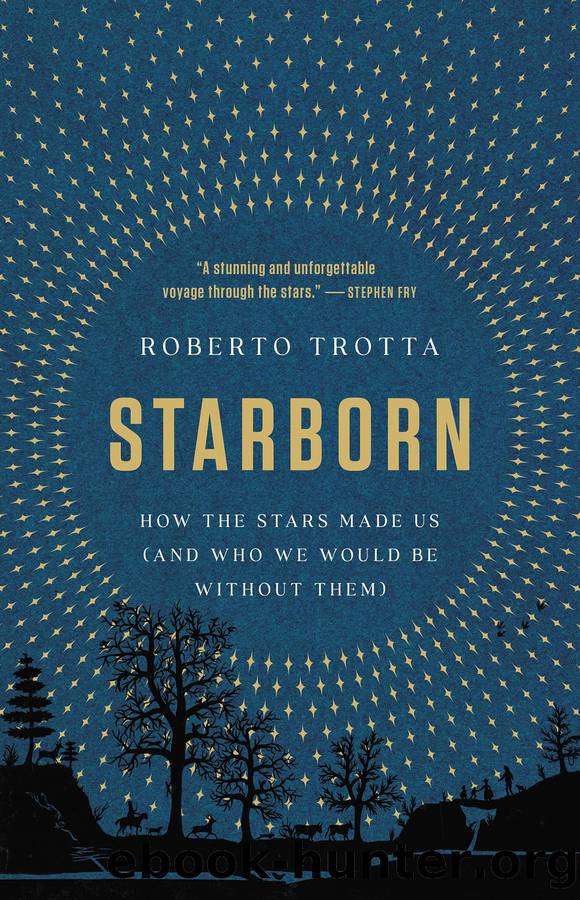Starborn by Roberto Trotta

Author:Roberto Trotta [Trotta, Roberto]
Language: eng
Format: epub
Publisher: Basic Books
Published: 2023-11-07T00:00:00+00:00
ISAACâS DIALS
After an unhappy childhood spent largely in the care of his grandmother, the young Isaac Newton moved to the village of Grantham to attend grammar school. At Grantham, the majesty of the heavens had impressed itself onto the mind of the schoolboy who, as we saw in Chapter 2, played pranks on the villagers by flying lanterns on kites to imitate comets. When he wasnât scaring the villagers to death or building a model windmill or wooden cart, young Isaac was busy filling his lodgings with sundials. From his room in the local apothecary, âIsaacâs dials,â as they became known to family and neighbors, spilled over into the entrance hall and sprouted on every wall where the Sun shone. Pegs and strings marked the hours, and Newton learned how to tell from his sundials the day of the month and the exact time of equinoxes and solstices. Seven decades later, as an old man, Newton still looked at the shadows in a room to tell the time.
By 1669 Newton had become the second Lucasian Professor of Mathematics at Trinity College, Cambridge. The Lucasian Chair was one of the best endowed positions at the university and the only one connected with mathematics or natural philosophy. Quite how Newton managed to be appointed to it by his predecessor, Isaac Barrow, remains shrouded in mystery. We do know that for the twenty-eight years Newton held the position, he enjoyed a generous stipend on top of free lodgings and dining privileges in the college and almost no academic duties. He only ever had three pupils, and even after he had become Englandâs most famous natural philosopher, whatever lectures he gave remained poorly attended: few went to hear him, and even fewer understood him, so that he often found himself lecturing to the walls and returned to his rooms and his work within a quarter hour for want of an audience.
This does not seem to have bothered him at all. Free to dedicate himself wholly to his studies, Newton threw himself into optics, mathematics, and physics. His many achievements include clarifying the nature and behavior of light, particularly colors; the invention of calculus, notwithstanding German mathematician Gottfried Leibnizâs claim to the independent development of similar ideas (which led to decades of bad blood between the two); and, of course, devising the law of universal gravitation and the laws of motion that bear his name. He also spent a decade pouring over obscure alchemical texts, in the hope of synthetizing from them a new form of natural philosophy. He focused on his work to the detriment of everything else, âthinking all Hours lost, that was not spent in his Studyes,â according to his assistant: he usually ate alone in his rooms, hardly received visitors, and did not mingle with the other fellows, leaving his lodgings only to give his lecturesâshort as they often were.28 His assistant said he only saw him laugh once.29 On the rare occasions when he elected to dine in the shared
Download
This site does not store any files on its server. We only index and link to content provided by other sites. Please contact the content providers to delete copyright contents if any and email us, we'll remove relevant links or contents immediately.
The Lonely City by Olivia Laing(4798)
Animal Frequency by Melissa Alvarez(4461)
All Creatures Great and Small by James Herriot(4311)
Walking by Henry David Thoreau(3953)
Exit West by Mohsin Hamid(3823)
Origin Story: A Big History of Everything by David Christian(3687)
COSMOS by Carl Sagan(3617)
How to Read Water: Clues and Patterns from Puddles to the Sea (Natural Navigation) by Tristan Gooley(3460)
Hedgerow by John Wright(3354)
How to Read Nature by Tristan Gooley(3335)
The Inner Life of Animals by Peter Wohlleben(3309)
How to Do Nothing by Jenny Odell(3293)
Project Animal Farm: An Accidental Journey into the Secret World of Farming and the Truth About Our Food by Sonia Faruqi(3212)
Origin Story by David Christian(3194)
Water by Ian Miller(3177)
A Forest Journey by John Perlin(3067)
The Plant Messiah by Carlos Magdalena(2927)
A Wilder Time by William E. Glassley(2858)
Forests: A Very Short Introduction by Jaboury Ghazoul(2836)
